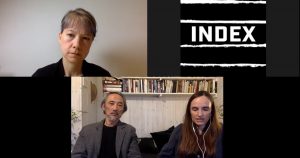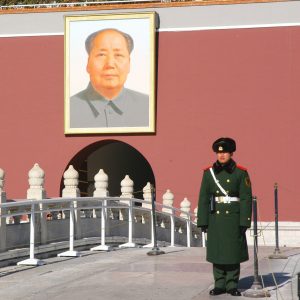Index relies entirely on the support of donors and readers to do its work.
Help us keep amplifying censored voices today.
[vc_row][vc_column][vc_single_image image=”117061″ img_size=”full” add_caption=”yes”][vc_column_text]Threats to free speech and free expression come in many guises. In the year since I’ve joined the team at Index, I’ve used this blog to highlight issues as diverse as journalists being assassinated in Afghanistan to the threats of new British legislation on online harms.
One of recurring themes of my blogs has been the way in which authoritarian regimes and groups use every tool at their disposal to repress their populations. From Belarus to Myanmar, from Modi to Trump, we’ve seen global leaders act against their own populations to hold onto power and stop dissent.
For an organisation such as Index it would be easy to think that our job was solely to highlight the worst excesses of these despots, to shine a spotlight on their actions and to celebrate the work and activities of those inspirational people who stand up against this tyranny. And of course, that’s exactly what we were founded to do. But as the world moves on and technology and finance facilitate new ways of communicating to the world, Index also has a responsibility to investigate, analyse and expose the impact of some countries beyond their borders.
Over the course of the last year, Index’s attention has been drawn to the fact that there have been multiple high-profile examples of the Chinese Communist Party (CCP) using its influence beyond its border in order to manipulate the world’s view of China and what it means to be Chinese:
Since the implementation of the National Security Law in Hong Kong in June 2020, universities in the UK and in the US have reportedly had to change the way they teach certain courses – grading papers by number not name, asking students to present anonymised work of others so nothing can be attributed to an individual student and limited debate in lectures. All in order to make sure that the students are protected, and their families aren’t targeted at home in China.
In September 2020 Disney released a new film – Mulan. This film not only represents Mulan as Han Chinese rather than Mongolian as she likely was in the legend, but it was also filmed, in part, in Xinjiang province, home of the persecuted Uighur community. Seemingly an effort to change the narrative on the ongoing Uighur genocide happening in Xinjiang.
In October 2020, a scheduled exhibition on Genghis Khan and the Mongol empire in Nantes, France was postponed – not because of Covid19 but because the CCP reportedly attempted to change the narrative of the exhibition, attempting to rewrite history.
It is clear that the CCP is using soft (sharp) power in a concerted effort to censor dissent and to create a narrative that is in keeping with Xi Jinping’s vision in an effort to secure international support for the CCP, which this year celebrates its 100th anniversary. We have no idea how strategic or vast this level of censorship is. What we do know is that it is happening across Europe and beyond.
It is in this vein that I’m delighted to be able to tell you about a new workstream for Index:
#BannedbyBeijing will seek to analyse and expose the extent to which China is trying to manipulate the conversation abroad.
Next week I’m delighted that we have an amazing panel to get the ball rolling and to establish how big an issue this is.
So join Mareike Ohlberg, Tom Tugendhat MP, Edward Lucas and our Chair Trevor Phillips, on Wednesday as they start this vital conversation. You can sign up here >> https://www.eventbrite.co.uk/e/banned-by-beijing-is-china-censoring-europe-tickets-162403107065[/vc_column_text][/vc_column][/vc_row][vc_row][vc_column][three_column_post title=”You may also want to read” category_id=”41669″][/vc_column][/vc_row]
[vc_row][vc_column][vc_column_text]
 Even in the middle of a global pandemic there has been one country that has broken through the news cycle – China. The acts of the Chinese government in recent years are a true cause for global concern. From Hong Kong to Tibet, from Xinjiang to Inner Mongolia we are all witnessing the actions of an authoritarian regime, one that seemingly thinks little of human rights or of its citizens. To the outside observer the Chinese government seems more interested in quashing dissent, re-writing history and bending the rest of the world to fit its narrative, than it does on embracing core human values.
Even in the middle of a global pandemic there has been one country that has broken through the news cycle – China. The acts of the Chinese government in recent years are a true cause for global concern. From Hong Kong to Tibet, from Xinjiang to Inner Mongolia we are all witnessing the actions of an authoritarian regime, one that seemingly thinks little of human rights or of its citizens. To the outside observer the Chinese government seems more interested in quashing dissent, re-writing history and bending the rest of the world to fit its narrative, than it does on embracing core human values.
Index has written extensively over many years about the impact of this within China, the effect on media freedom, freedom of expression and freedom online. We’ve highlighted the work of incredibly brave dissidents demanding democracy in Hong Kong. We’ve featured the words of Uighur poets, the writings and musings of Ai Weiwei and the amazing work of organisations like GreatFire who every day challenge the firewall that the Chinese government has erected, restricting their citizens access to global information.
But the Chinese government is more than an authoritarian government. It is a government built on the ideology and infrastructure of the Chinese Communist Party (CCP). This year marks the centenary of the CCP and in the latest edition of Index on Censorship magazine we’ve focused on the impact of the CCP both at home and abroad. Of the many features in our special report, what is most touching, at least for me, are the beautiful words of Ma Jian, the acclaimed writer in exile. Ma Jian reflects on the impact of the CCP on his life and why he has to live in exile.
When Index on Censorship was launched, one of our founders, Stephen Spender, was adamant that it was going to be more than a frustration sheet, we were going to be a home for amazing writing that inspired and moved us. Ma Jian’s words did exactly that, which he did once again when he spoke at the launch of the magazine on Wednesday.
His personal testimony will haunt me, his words were beautiful and reminded me once again of the vital importance of our work. Please take a minute to read Ma Jian in his own words, he will inspire you.
And to enter the bank holiday on a positive note, a few more words of hope from Ma Jian.
[/vc_column_text][/vc_column][/vc_row][vc_row][vc_column][three_column_post title=”You may also want to read” category_id=”41669″][/vc_column][/vc_row]
[vc_row][vc_column][vc_column_text]

Photo: PublicDomainPictures
The awful actions of the Chinese government over the last month have dominated our news agenda. The collective actions of the government and their outliers have been designed to silence dissent, to intimidate and to bully.
They have repeatedly attacked core democratic principles both at home and abroad, undermining fair political participation. They’ve arrested democracy activists, changed the law to restrict electoral access to the Hong Kong Legislative Council to sanctioned ‘patriots’ otherwise known as the allies and friends of the Government of China.
The ruling Chinese Communist Party (CCP) has also sanctioned British parliamentarians and activists for daring to speak out about the acts of genocide, happening as I type, in Xinjiang province against the Uighur community. The CCP chose not to target members of the British Government nor key businesses with sanctions.
Instead, it sent a political message and targeted backbench Conservative MPs, two think-tanks and an academic, those who had been most vocal in exposing the actions of the CCP in both Xinjiang and Inner Mongolia. This was a move intended to silence criticism not impose economic sanction, a clumsy and ineffectual effort to restrict free speech outside China’s borders.
This week, these aggressive actions by the CCP culminated with yet another attack on media freedom when the BBC’s lead China correspondent, John Sudworth, was forced to relocate with his family from Beijing to Taiwan after a campaign of state-sanctioned threats and intimidation. Sudworth and his wife, a fellow journalist for the Irish RTE, Yvonne Murray, were faced with no other option than to leave after months of personal attacks in Chinese state media and by Chinese government officials. They will both continue to report on events in China from Taiwan.
The harassment of international journalists in China (and now in Hong Kong) is becoming normalised, with dozens of journalists having to leave in recent months; threats of visas being withheld are now commonplace. This is simply unacceptable.
China seeks to be a loud voice on the global stage – they need to live up to their commitments under the Universal Declaration of Human Rights. They need to remember they are signatories to Article 19 and that media freedom and free expression are protected rights.
Index stands in solidarity with John and Yvonne.[/vc_column_text][/vc_column][/vc_row][vc_row][vc_column][three_column_post title=”You may also want to read” category_id=”41669″][/vc_column][/vc_row]